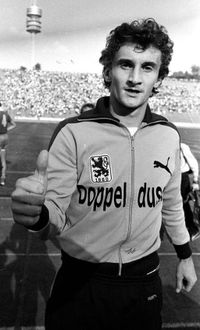As Rudi Völler celebrates his 65th birthday on April 13, 2025, the German football icon reflects on a career that has made him a beloved figure in the sport. Known for his charismatic personality and remarkable achievements on and off the pitch, Völler has become a symbol of German football culture.
Born in Hanau in 1960, Völler began his journey in football with TSV 1860 Hanau before moving on to professional clubs like Kickers Offenbach, TSV 1860 Munich, Werder Bremen, AS Roma, Olympique Marseille, and Bayer Leverkusen. His professional career spanned from 1977 to 1996, during which he amassed an impressive record of 315 goals in 671 competitive matches.
Völler's breakthrough came in the summer of 1982 when he transferred from Zweitligist 1860 Munich to Werder Bremen for a then-staggering fee of one million D-Mark. In his first Bundesliga season, he was named Footballer of the Year, a testament to his immediate impact in the league. He made his debut for the national team shortly thereafter, scoring his first international goal in a 0:1 defeat against Northern Ireland.
One of the highlights of Völler's career came in 1990 when he was part of the German national team that won the FIFA World Cup in Italy. He played a pivotal role in the tournament, famously winning a penalty in the final against Argentina, which was converted by Andreas Brehme. Völler’s contributions to the national team were significant, as he scored 47 goals in 90 appearances, cementing his status as a key player during a golden era for German football.
After his successful playing career, Völler transitioned into management and administrative roles. He took over as head coach of the national team in 2000, initially as a caretaker after Christoph Daum's scandal, and led the team to the World Cup final in 2002, where they finished as runners-up. His leadership style and passion for the game endeared him to fans and players alike.
Völler's tenure at Bayer Leverkusen was equally impressive. He served in various capacities, including sports director and interim coach, and was instrumental in the club's development over the years. His recent extension of the contract as the DFB Sports Director until 2028 shows his ongoing commitment to the sport and his influence in shaping the future of German football.
In addition to his professional accomplishments, Völler is known for his authenticity and down-to-earth nature. His popularity transcends his achievements; he is often regarded as a national treasure. Völler’s engaging personality has led to memorable moments, including his infamous "Wutrede" (rage speech) in 2003 after a disappointing draw against Iceland, where he passionately defended his team against critical commentators. This incident only solidified his status as a fan favorite.
Furthermore, his time at AS Roma from 1987 to 1992 is often described as the highlight of his playing career. Despite a rocky start, Völler quickly became a fan favorite, eventually being named the club's best player of the season. His connection to the club and the city of Rome remains strong, as he often recalls those years fondly.
Völler’s personal life is also noteworthy; he has been married to Sabrina since 1995, and they have built a family together. His roots in Hanau are evident as he continues to support local football initiatives, including a recent donation of 6,600 euros to eleven football clubs in collaboration with the city.
As Völler celebrates his milestone birthday, he is not only remembered for his contributions on the field but also for his character and the joy he has brought to millions of fans. His legacy is one of passion, dedication, and a love for the beautiful game that has inspired generations.
In the coming days, a Sky Original documentary titled "Rudi Völler - Die Dokumentation" will be released, featuring insights from former teammates and coaches, including Lothar Matthäus and Oliver Kahn, further highlighting his impact on football.
With a career spanning decades and a reputation that continues to grow, Rudi Völler remains an integral part of the fabric of German football. As he celebrates this special day, fans and fellow players alike will undoubtedly join in honoring a man who has given so much to the sport.









